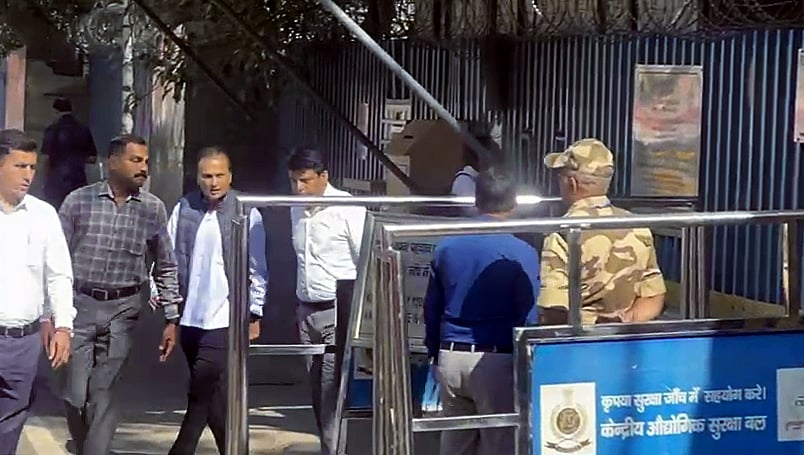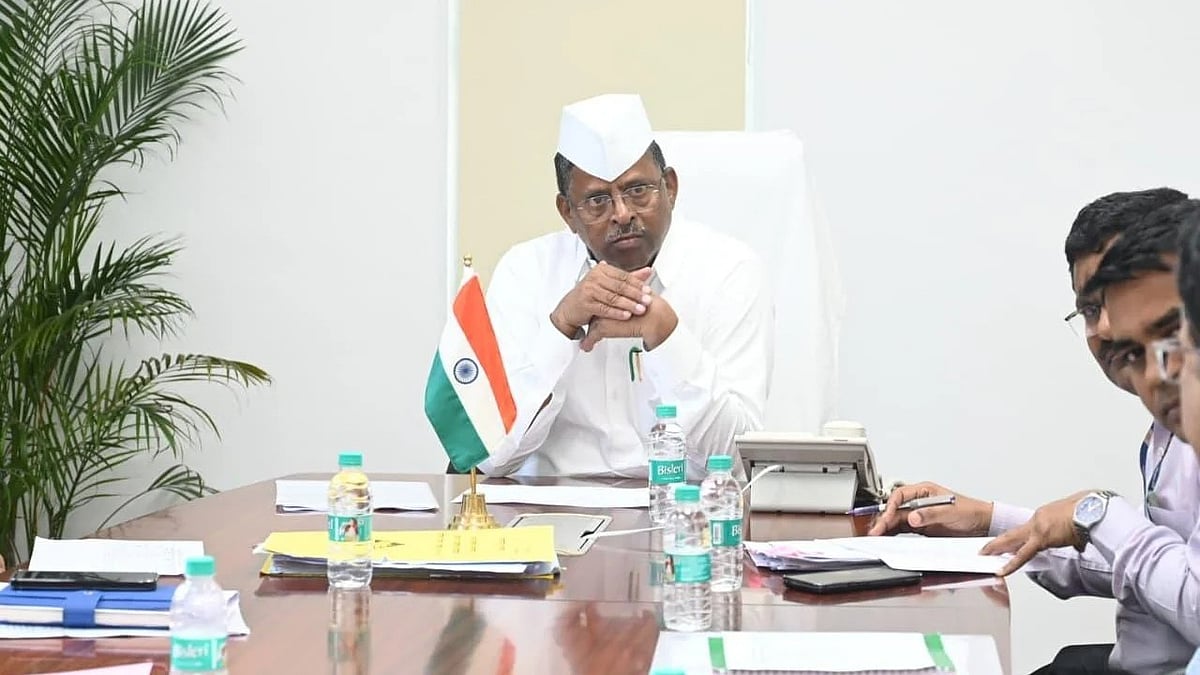In a free-wheeling chat aired during the peak of COVID lockdown, UK-based author, speaker, filmmaker and entrepreneur Raga Olga d’Silva interviewed actor Manoj Bajpayee to find out ‘Who is the real Manoj Bajpayee?’ As she delved deep into exploring the real person, who grew up in a small village in Bihar before making it big in Mumbai, she requested him to speak in his mother tongue. Bajpayee responded in chaste Bhojpuri, and with this impromptu act, the true son of the soil knocked the socks off for all. “Bhojpuri is my mother tongue. The language I grew up speaking at home,” and with a child-like innocence added, “I learned Hindi and a little bit of English at school, and worked hard to improve my English in Delhi and that too by hanging out with Tanzanian and Kenyan college friends.” His honest admission pulled at the heartstrings of one and all.
Singing star
Barely two months later, the actor let the cat out of the bag by crooning a Bhojpuri Rap - Bambai Main Ka Ba. The video featuring him in a funky avatar as a rapper was a long-due collaboration between two old friends - Bajpayee and director Anubhav Sinha, and the ensuing migrant crises in the wake of the lockdown only fuelled their desire to come together. “Bhojpuri is my identity, nature, culture, and I am proud of it. I have never been away from my roots. Bhojpuri is my bridge to cover the geographical distance between Belwa and Mumbai, and brought me closer to my roots,” he says. The song with English subtitles by senior journalist Sankarshan Thakur has clocked in close to 84 lakh views and counting. The heart-wrenching lyrics highlighting the plight of migrants were penned by Dr Sagar, with music by Anurag Saikia.

Recounting the musical journey, Sagar says, “Several Bhojpuri songs abusing actor Rhea Chakraborty had gone viral on social media during those days. The vulgarity was appalling, and it had ired so many of us, including filmmaker Anubhav Sinha. A pained Sinha tweeted, saying, “if there’s any a good lyricist who can write in Bhojpuri, he wouldn’t mind taking a plunge into the world of Bhojpuri films.”
Someone recommended Sagar’s name to him, and the rest, as they say, is history. Sinha sent him a beat, and one sleepless night later, he got cracking on finding words to convey the migrants’ misery that was unfolding all around then. “I had been itching to write in my mother tongue for long, and this song seemed to happen at the most opportune time. It is a collective ode to all the migrants from all over, for all that they leave behind in their native villages, their trouble and turmoils in the big cities, and the dreams that they nurture in their weary hearts,” he says.
Migrants matter
Another Bhojpuri song that put the devastating impact of the pandemic and the subsequent lockdown on the lives and struggles of migrant workers from UP and Bihar in sharp focus was released by actor-singer Amrendra Sharma in June last year. As he calls himself a ‘migrant creative labourer’, Sharma was shaken to the core after seeing the scale of unprecedented misery of the millions of migrants. “I hail from Bettiah but have stayed in Delhi during the early noughties and then Kolkata and am now based in Mumbai. I could relate to their pain in entirety,” says Sharma, who isn’t a trained singer but went on to release a song - Chal Re Batohi Chal Re Apan Gaon - on his YouTube channel.

"I had written the first stanza in 2018, and fine-tuned the rest of it with Abhijeet Mishra and Ashutosh Tiwari over the years. I was in my village during the lockdown, and as if the universe conspired to make this song happen. It was recorded and shot on a shoe-string budget within limited means and resources available around, but it has received overwhelming love and response from all over, and that gladdens my heart," adds Sharma. The visuals showed how a migrant had to pedal along to reach home during the lockdown.
Across the shore
During the lockdown, The Netherlands-based Sarnámi-Bhojpuri singer and songwriter Raj Mohan collaborated with various artists worldwide to record Batohiya song written by renowned Bhojpuri poet Babu Raghuveer Narayan; it enjoys an iconic status among Bhojpuri-speaking people India and abroad.
“I discussed the idea with my manager and business partner in India, Devendra Singh, who came aboard and coordinated with various artists in India and overseas, managed audio and video recordings and did online marketing. My student and artist Ragga Menno also came along,” says Mohan. With direction, music and vocals by Mohan, the song features 11 singers from 7 different countries - Munna Singh, Chhotu Bihari, Arya Nandini and Vishwajeet Pratap Singh from India; Hemelbesem from South Africa; Terry Gajraj from Guyana/USA; Ilhaam Ahmadali from Suriname; Rukshana from The Netherlands; and Angel ArunA, and Menno from Suriname/The Netherlands. Mohan’s song gave a kaleidoscopic view of the depth and reach of the language spoken not just in India, but across Fiji, Maldives, Mauritius, Suriname, South Africa, The Netherlands, and Caribbean countries as a result of the ‘girmitiya’ or indentured migration during the colonial period. Various versions of the same song are doing the rounds on the Internet, but Mohan proudly says that his song is the best. "We are batohiyas (travellers) in the truest sense. The song is about us. It conveys our pride, longing, belonging and even sadness and connects us with the land of our ancestors. It has a great nostalgic value," he reasons on the emotional quotient of his musical offering.

Cinema escape
Interestingly, a few movies - Devanshu Kumar and Satyanshu Singh’s Chintu Ka Birthday, Devashish Makhija’s Bhonsle and Prateek Vats’ Eeb Allay Ooo - on the Bihari migrant’s plight, albeit all with a strikingly different plot, were released on OTT platforms and theatre. These films were important documentation of the unprecedented miseries that a migrant goes through when he chooses to live and work elsewhere in his country and overseas. Makhija, himself a migrant, twice over, was heartened to see the outsider at the epicentre of some of the most lauded films of 2020.
He says, “Alien/outsider/immigrant/migrant has populated storytelling all across the world. But this entity is always of a different nationality in the stories of all other countries, but in India, it belongs to the same nationality, and one is called a ‘migrant’ when working/living in another region/state. This irony is unique to India.” He adds how when fascism in different avatars is fanning the flames of disparity in more and more ways across the country, this entity is resurfacing in filmmakers’ stories. Adding to this, screenwriter and journalist Mayank Saxena says, “These films blurred the lines between real and reel and were a reflection of the times that we lived in 2020. What the audience saw on their 14” screen was, to some extent, a cinematic interpretation/extension of what lakhs of unknown migrants lived through. Unfortunately, many lost their lives well.” Makhija couldn’t agree more with him. “Last year was a particularly rough one for the ‘migrant’. And films that turned the spotlight on this outsider suddenly found relevance when earlier the audiences would disregard their stories,” he says.
Saxena adds another interesting perspective that may come as a surprise to many. “Most of the South Indian action movies are dubbed in Hindi with a generous overdose of Bhojpuri words and dialogues to cater to their huge fan base in the hinterland,” he adds.

Even though folk songs in Bhojpuri have been a part of the Hindi films since the black and white era, the year ended on a soulful note in folk singer Sharda Sinha's voice. Her poignant song Bidhawa in Satish Kaushik’s directorial debut Kagaaz starring Pankaj Tripathi, a proud Bhojpuri speaker, remains another high point. The song was released on YouTube by Salman Khan Films on popular demand on January 13, 2021. "Satish Kaushik had contacted me for singing this song. Pravesh Mallik's tune is similar to the tune of "Balamuo se door kaila" from my old album, Kekra Se Kahan Mile Jala released in 1984-85. The tune is basically a Mirzapuri Kajri. It is a script-based song that uses words that suit the scene in the movie. It was heartening to see a mainstream film give this space in Bhojpuri," she says.
Politically correct
The breakout star of 2020 was a young folk singer Neha Singh Rathore whose songs in Bhojpuri critiqued and questioned the governments and made her a social media sensation in no time. “The lewd and innuendo-laden Bhojpuri songs perturbed me, and my endeavours are aimed at restoring the lost glory of Bhojpuri music,” says Rathore, who credits her mother for initiating into the world of music. Rathore's YouTube channel Dharohar has 177K subscribers, and the USP of her self-written songs is all about the fundamental democratic right to question the governments and their functioning.

"I have been doing this for a year now. My first song was on the Swachh Bharat Mission and how people in the villages were defeating the purpose by giving hygiene and sanitation a miss and opting for open defecation," she says on her foray in the musical world. Of the many songs, the ones dealing with migrant workers, lockdown woes, unemployment, social issues, politics and politicians of the state and country hit the right chords with the people. A song battle ensued when she highlighted the sad state of affairs in Bihar Me Ka Ba? A quick rebuttal by BJP in the poll-bound Bihar saw the release - Bihar Me Ee Baa - in Bhojpuri, highlighting the developments that had taken place in the state during the NDA rule. So the trend that started with Sinha’s song that talked about why migrants from northern states arrive in Mumbai using Bhojpuri as a medium to communicate with the masses and classes continued with Rathore and the political party using the language to reach out to the resident and non-resident Bhojpuri speakers of Bihar. On the use of Bhojpuri in the campaign song, Saxena says, “It was to cash in on the emotional quotient of Bhojpuri. The medium conveyed the message to the voters living in Bihar and also those living outside the state. It is so close in vocabulary and syntax to Hindi that most people from elsewhere can also understand it without much difficulty.” Sagar too agrees with Rathore and adds that it is time to bring back the lost glory of our language with meaningful lyrics like the ones that Bharat Sharma wrote for Bhojpuri films once upon a time.
Hooked and booked
According to the Ministry of External Affairs’ response in Lok Sabha in 2018, the language has close to 28.50 lakh speakers spread across India and abroad. “But the rich Bhojpuri literary tradition of writers like Bhikhari Thakur and Gorakh Pandey has a fairly negligible presence in the literary circuit because the speakers of this language aren’t necessarily also the readers,” says Dr Braj Bhushan Mishra, a doyen of Bhojpuri literature. That perhaps explains why the long and diverse Bhojpuri literary tradition remains mostly unnoticed and even neglected. “It is because Bhojpuri is largely perceived to be a folk language spoken by illiterate villagers. The other reason could be the near absence of its interactions with the other literary cultures, through translations or otherwise,” notes academician and writer Gautam Choubey, who has translated Pandey Kapil’s Bhojpuri novel - Phoolsunghi - into English that hit the stands in November 2020. With this attempt, he aims to bridge the gap and give Bhojpuri its due. Chaubey was initiated into the fascinating world of Bhojpuri literature by his late mother.

“My maternal grandfather, Dr Chandradhar Pandey’ Kamal’, was a renowned name in the Bhojpuri literary circuit. I chose the story because it has been a part of folk legend. The idea was to translate and make it accessible to many others as a tribute to my mother and her memories," says Choubey on his literary journey. Sagar credits the English translation of his songs for its huge success. "My former Manipuri roomie from the JNU hostel could understand and enjoy the song, and I was elated to hear this. I was flooded with calls from all over the country and world over because English bridged the language gap and made the song such a rage even among non-Hindi speakers," he says.
Write approach
Applauding Choubey’s literary outing, Mishra says, "By choosing Pandey Kapil’s most representative work, he has done justice to the language because Phoolsunghi is about Bhojpuri culture and deals with the dilemma of another great literary figure of Bhojpuri literature, Mahendra Misir." The pandemic gave umpteen opportunity to people who speak and understand this language to have engaging conversations on various online platforms like Aakhar, Bhojpuri Manch, Bhojpuri Junction, Bhojpuri Manthan on topics that the mainstream media had largely neglected. Mishra also highlighted how the publishing industry has also made an earnest attempt to revive Bhojpuri’s rich literary tradition during the lockdown months by releasing publications in the language. It bodes well for the language. “The online movement helped revive interest in the language to a large extent,” quips Choubey, who is currently working on the first anthology of short stories in Bhojpuri by Bhikhari Thakur, and has also submitted a proposal to the Sahitya Academy on the history of Bhojpuri literature. He plans to write something in Bhojpuri someday soon.
In the news circuit, Earshot launched in October 2020 amid the pandemic as India’s first digital audio venture for news and entertainment in five languages, including Bhojpuri. “Bhojpuri has a special place in our hearts. It is a language that millions speak but is still to get its due. We will remember 2020 as the year in which we rolled out our signature Bhojpuri shows like Baahubali, Gangs of Purvanchal and Derahia Maat. You can now listen to shows like Jiya Raja Benaras on Dolby Atmos,” says Abhijit Majumder, co-founder and editor-in-chief, Earshot.
Common concern
Inclusion of the Bhojpuri language in the Eighth Schedule of the Constitution has been one of the oldest demands of the people who speak this language. Currently, 22 languages are listed under this Schedule and include Nepali, Sindhi and Maithili. “If that happens, the employment prospects of the Bhojpuri-speaking populace will improve drastically,” says Mishra, highlighting it as one of the reasons for the long neglect. But 2020 changed that, and the speakers of this sweet language who get to earn their living because of it couldn’t ask for more. “My job allows me to connect with other Bhojpuri speakers from India and abroad. It fosters a sense of belonging that gives me a lot of professional and creative satisfaction that is also monetarily compensated,” says Manish Raj Masoom, Assistant Editor and Anchor, Earshot.
These commendable efforts have made Bhojpuri a language to reckon with, and these milestones may help it make deeper inroads in the mainstream world. "That time has come," adds Sagar on an optimistic note.





